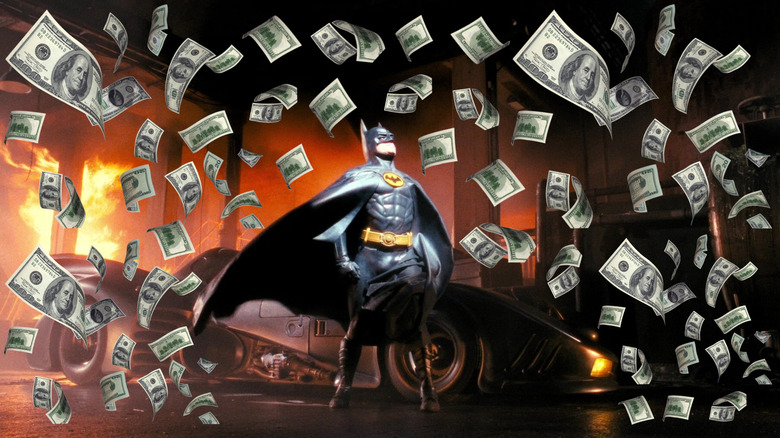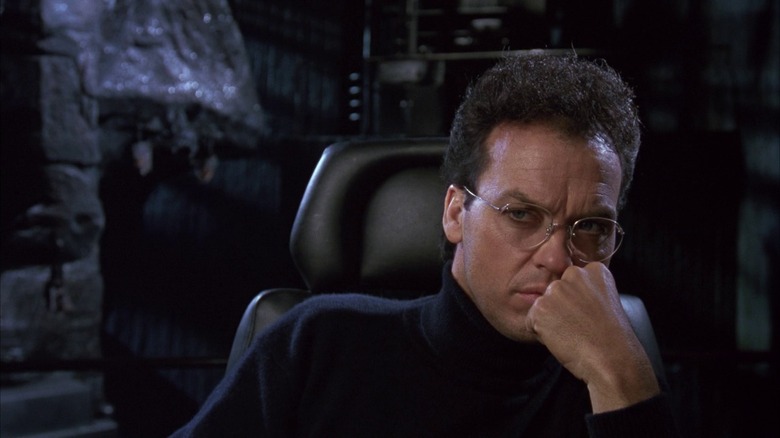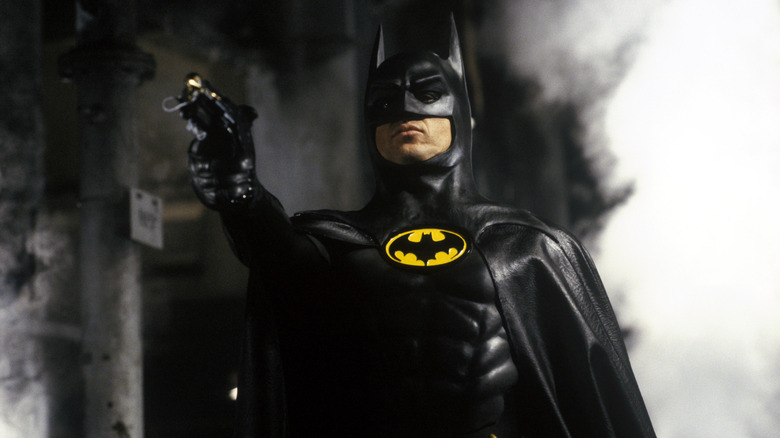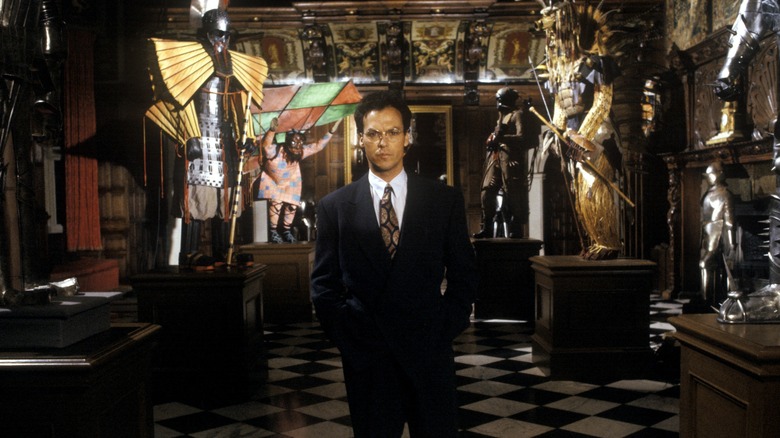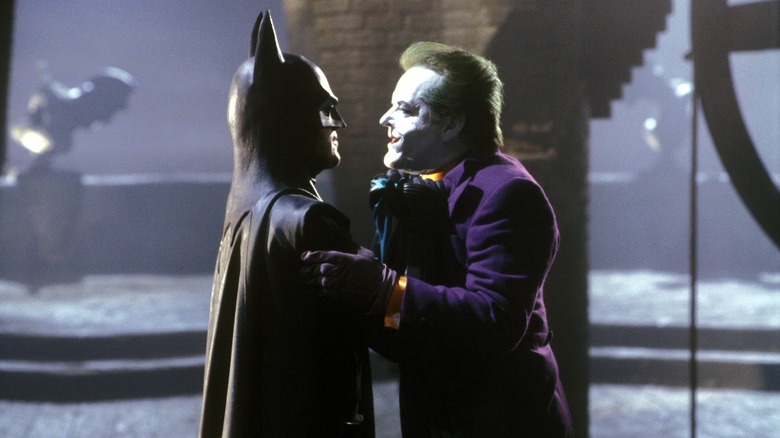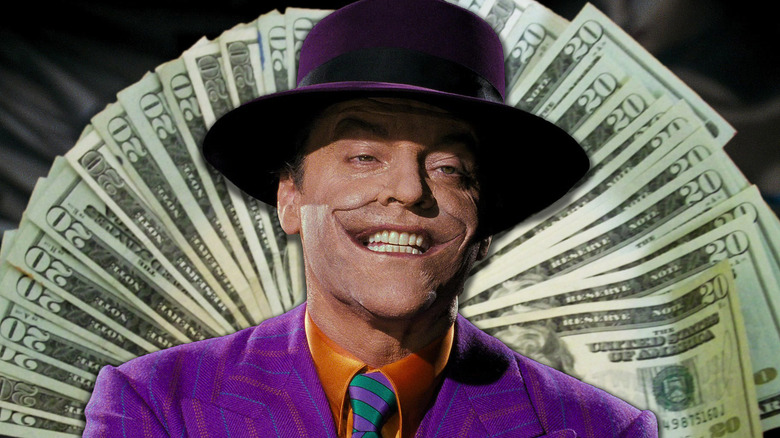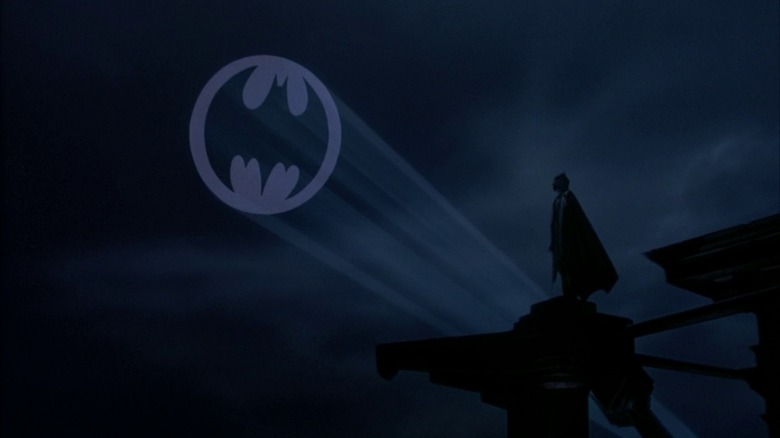How 1989's Batman Made Tim Burton A Box Office Superhero
(Welcome to Tales from the Box Office, our column that examines box office miracles, disasters, and everything in between, as well as what we can learn from them.)
"That's their stuff, their business. They have a film in mind. I've already done it. I've done my Batman." Those were the words uttered by TV's Batman Adam West when asked about the casting of Michael Keaton in a new "Batman" film being put together by Warner Bros. in the late '80s. "Do you want the classic Coke, or do you want the new stuff? Maybe both." West suggests his hammy take on the DC Comics hero was Coke while Keaton would become New Coke. The only problem with West's metaphor is that, in this scenario, New Coke won the battle handily.
It's easy to forget now but there was a time when the general public's only image of Batman was West's take from the joyful and campy '60s TV show. It was the opposite of dark and brooding, to be certain. In the '80s, comic book movies were far from the top of Hollywood's list of ways to secure a surefire hit. Yes, Richard Donner's "Superman: The Movie" became a massive hit in '78, but that was more of a fluke rather than something that kicked off a trend. In short? Just about everything was working against "Batman" before it came to fruition. But thanks in large part to director Tim Burton, the Caped Crusader became an enduring, towering pop culture icon.
In this week's Tales from the Box Office, we're looking back at Tim Burton's "Batman" in honor of its anniversary. We'll go over the long journey it took to make it happen, how Burton landed the job, the then-controversial casting of Keaton in the lead role, Nicholson's very unique deal that got him to agree to do the film, what happened when it hit theaters, and what lessons we can learn from it all these years later. Let's dig in, shall we?
The movie: Batman (1989)
1989's "Batman" sees the emergence of a madman masquerading as a clown who calls himself "The Joker" (Jack Nicholson) who takes control of Gotham City's criminal underworld. Batman (Michael Keaton) must deal with this new threat all while protecting his secret identity and his new love, reporter Vicki Vale (Kim Basinger).
The DC character, created by Bob Kane and Bill Finger, had been around for 50 years before the movie came along. But after the '60s TV show went off the air, the general public largely lost interest. But not Michael E. Uslan. The writer and eventual producer made it his mission to make a "Batman" movie happen. In a 2005 interview with Batman on Film, Uslan recounted his early meeting with then-head of DC Comics Sol Harrison about the idea.
"'Michael, Batman is as dead as a dodo ... since it went off on TV.' He says to me, 'No one is interested in Batman. The only interest has been from CBS who wanted to know if the rights were available because they wanted to do a 'Batman in Outer Space' movie.' I said 'Sol, I really believe I can do this.' He then advised me to go get credentials, and when I had the credentials, come back and see him. He assured me that in the meantime, no one would take the rights to Batman."
So yeah, it was a different time, to say the least. Good to his word, after Uslan finished law school and got a job at United Artists, Sol helped him get the ball moving. Around 1979, Uslan obtained the rights along with Benjamin Melniker. It would be another decade before his dream film would come to fruition. Various studios and filmmakers turned the movie down in the ensuing years. Uslan even wrote a version of the script himself titled "Return of the Batman" to offer some sense of what he was going for. Warner Bros., having also made 1978's seminal blockbuster "Superman: The Movie," eventually decided to take a shot on the Dark Knight.
Tim Burton takes on The Dark Knight
Producers Jon Peters and Peter Gruber eventually got the project moving in the right direction. In no small part thanks to the success of 1985's "Pee-wee's Big Adventure" in concert with the publication of Frank Miller's seminal 1986 work "The Dark Knight Returns," the film finally gained momentum. After many drafts of the script and scrapped takes, the producers finally had a darker direction worth chasing. They also had a director in Tim Burton, who was emerging as a young visionary in Hollywood.
Burton's value to Warner Bros. was further cemented when "Beetlejuice" became a hit in 1988. The studio had their man, that much was certain. The movie also secured them their lead actor in Michael Keaton, but more on that in a moment. Speaking in a 1989 documentary to promote the film, Burton explained what attracted him to the film. In short? It was the characters.
"The reason Batman attracted me is, I love extreme characters, and I love the idea of a man who dresses up like a bat versus a man who is literally turned into a clown. Two good characters there ... Things like The Dark Knight and The Killing Joke are very good for the movie in the sense that they go back to psychology, and yet they blow apart the conventions a bit.
With Miller establishing this attractive, darker version of Batman, Burton was free to explore that on film. He and his team set about imagining their version of Gotham City. They thought about what might have happened to New York City if everything had gone wrong, according to production designer Anton Foust. "It was like hell had erupted through the pavement and kept on growing."
The idea, as Foust put it, was to have everything exist in "no period of time," not seeking to emulate any specific era. That notion allowed for a great deal of freedom of expression. Burton's distinctive gothic imagery, from the timeless Batmobile to the Joker's ridiculously long gun, gave the film a real sense of character.
Michael Keaton becomes a controversial choice to take on Batman
Burton also enlisted Danny Elfman to compose the soundtrack, having worked with him on "Beetlejuice" and "Pee-wee." This would give the film even more character in the end. But who would bring Bruce Wayne to life? Rather than go with a beefcake, it ended up being a man known for comedies like "Mr. Mom." To say Michael Keaton was an out-of-the-box choice is an understatement. "Michael is not Arnold Schwarzenegger," Burton said of Keaton's unconventional casting in that same '89 documentary. "I met a lot of what I would consider to be good, square-jawed actors. Bottom line for me is I couldn't see them putting on a bat suit."
Yes, there was backlash to Keaton's casting as Batman, even in a pre-internet age. But it wasn't just fans who couldn't see it. Uslan, who had essentially willed this film into existence, didn't see it. So much so that he fought very, very hard against the decision.
"I yelled. I screamed. I carried on like a baby. I argued. I protested. I fought. I reasoned. I swore. I begged. I pleaded. I countered. I discussed. I debated. I called in allies from DC Comics," Uslan wrote in his memoir "The Boy Who Loved Batman." Fortunately, Burton eventually managed to win him over by using the logic that he could convince audiences that Keaton was the man crazy enough to put on a bat suit. "Missing from my gut fanboy reaction was accounting for the genius that is Tim Burton," Uslan concluded.
Sam Hamm and Warren Skaaren are credited with the script for "Batman," but an army of writers worked on it over the years. It was Burton who selected Hamm to pen a version befitting his vision. After a year's worth of work, Jon Peters brought Skaaren in to oversee significant rewrites during a WGA strike. The whole process was described as "Torture" by Burton in 2016. But it wasn't for nothing, that much would become clear.
Casting Jack Nicholson as the Joker
Even though "Batman" as a feature film was uncertain, Warner Bros. and Burton had a secret weapon in the form of Jack Nicholson. The Oscar-winning star of "Chinatown" and "The Shining" agreed to play The Joker in the film, lending it a great deal of credibility. It wasn't easy to get the actor to sign on though, as it took some persuading from Burton. Nicholson agreed to take a pay cut, but only if he got top billing above Keaton, and only if he was cut in on the eventual windfall of cash that was coming in the summer of '89. As Peter Gruber once explained, it was still a worthwhile investment.
"Part of the thinking in getting Nicholson was really similar, going back to the Marlon Brando concept in the first 'Superman' picture. You get such a great deal of respectability for the picture, for what you're trying to do, that not only does that help bring audiences in from young to old, but it also makes it very attractive to other major stars to want to become the next Batman villain."
Beyond having the actor's respected name on the poster, Nicholson brought the goods to his performance as The Joker. Part of what makes it work so well is that he truly went for it and wasn't afraid to be scary. This wasn't the optimistic superhero picture that Donner made with "Superman." Nicholson once explained that he felt the scarier he was, the better it would be.
"My early experience in working for an audience full of children: the more you scare them, the more they like it. The worse you are, the better, because that was my response to the Joker. This is a hateful occurrence, this man, if you looked at it literally. Every kid loves this guy, I believe."
The financial journey
Originally budgeted at $35 million, "Batman" came in much higher with a $48 million budget, which would be about $120 million in today's dollars. While that was an insane amount to spend on a superhero movie at the time, it's still far less than the $200 million Marvel and DC blockbusters we've become accustomed to. Warner Bros. also launched one of the most comprehensive marketing campaigns in history up to that point, from stylish posters to countless product tie-ins, and even a soundtrack by Prince, it was one for the ages. It paid off handsomely.
"Batman" opened in theaters on June 23, 1989, directly against Disney's "Honey, I Shrunk The Kids." It was no contest, as Burton's dark take on the DC hero opened to a record $40.4 million. That was just the beginning of a ridiculously great run, as the film stayed in the top 10 on the charts through mid-September, playing in theaters for most of the rest of the year. It was a runaway smash that led to hundreds of millions in merchandise sales as well, with toys flying off the shelves.
The film finished its original run with $251.1 million domestically to go with $150 million internationally for a grand total of $401.1 million worldwide. That total has since grown to $411.5 million thanks to its various re-releases. In no small part because of Nicholson's deal, there was debate for years as to whether or not "Batman" had actually turned a profit, silly as that may sound. Either way, this film was just the tip of the iceberg, as Burton kicked down the door to something much bigger in the process.
Burton departed the franchise after 1992's "Batman Returns," with Joel Schumacher taking over on "Batman Forever." Today, the "Batman" franchise is still going strong, with Matt Reeves' "The Batman" becoming a huge hit in 2022. To date, the series has earned more than $6.8 billion worldwide (and counting), including Christopher Nolan's "The Dark Knight" and "The Dark Knight Rises." Both eclipsed $1 billion.
The lessons contained within
Even without the man who largely helped birth one of cinema's most enduring franchises, Batman remains a singular figure in the pop culture landscape. From TV shows to even more live-action movies, there are few characters of any kind that can rival his popularity. Heck, that's why Warner Bros. has both "Batman: The Brave and the Bold" and "The Batman Part II" on the way. 35 years later, the Caped Crusader is still a crown jewel for the studio.
While it would be nearly a decade before Marvel scored a hugely important hit with "Blade" and later "X-Men" that would secure the future of comic book cinema for decades to come, it's impossible to argue against this movie's overwhelming significance. "Batman" may be of its time, but there is much to extract from its success through the modern lens.
It's not directly adapting any one story, rather, it is a valid interpretation of the character for another medium. One that, as Warner Bros. came to find, resonated with audiences in a big way. Burton made a good movie and, wouldn't you know it, people saw the movie. There was a real vision there, even though it was based on valuable IP. That's something we could stand more of as the superhero genre edges towards an uncertain future. Flops like DC's "Shazam! Fury of the Gods" and "The Flash" demonstrated that audiences will no longer show up automatically just because a superhero is present.
There's also the respect for the source material that led to "Batman." It was the success of books like "The Dark Knight Returns" that paved the way for this wildly important blockbuster in the first place. In the modern era, it feels like the comics take a backseat to everything else. Disney and Warner Bros. would do well to highlight the comics themselves 1) because it's the right thing to do and 2) because preserving the medium's integrity just might secure the next "Batman," rather than just going back to the same well over and over again.
